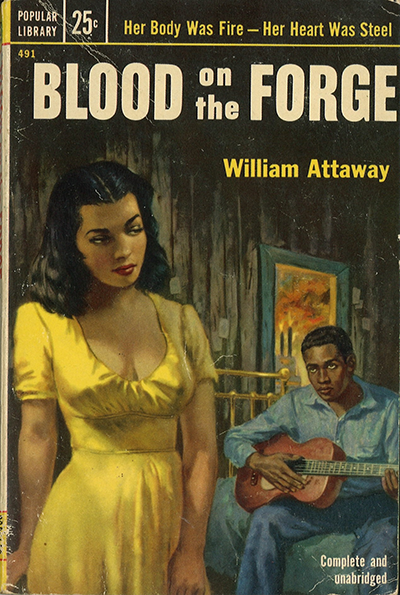

Blood on the Forge by William Attaway

William Attaway was born in Greenville, Mississippi, in 1911, and moved with his family to Chicago as a young child. The Attaway family's move was part of what is known as "The Great Migration," when millions of African Americans moved from the rural south to northern cities. Though he initially aspired to be an auto mechanic, William Attaway's physician father wanted his son to follow a more academic path. As a teen, Attaway was inspired by the writings of Langton Hughes and began to take his studies more seriously. He attended the University of Illinois, where he was a good student as well as an accomplished tennis player. His first major writing project was helping to write the Federal Writer's Project Guide to Illinois.
After moving to New York City, Attaway published his first novel, Let me Breathe Thunder. Because of the promise Attaway showed with the novel, he was awarded a Rosenwald Fellowship to work on his second novel. Blood on the Forge was released in 1941, one year after Richard Wright's Native Son. The novel takes place at the end of World War One and follows three brothers who move from the hills of Kentucky to Pennsylvania in the hopes of finding a better life away from the segregated south. After securing jobs in the steel mills, however, they discover that life in this new land is not what they had hoped.
Though not a hit upon its release, Blood on the Forge was praised by writers Richard Wright and Ralph Ellison, and the novel managed to grow in stature and reputation in the decades after its publication. A New York Review of Books Classics edition was released in 2005, with a new introduction by writer Darryl Pinckney. Though Blood on the Forge was Attaway's final novel, he went on to a successful career writing for radio, television, and films. He also wrote and arranged music, arranging songs and writing liner notes for Harry Belafonte. He went on to write The Calypso Song Book in 1957 and a children's nonfiction book Hear America Singing in 1968.
Despite the fact that Attaway did not leave behind a great deal of fiction, Blood on the Forge has secured an important place among American novels, being compared to Native Son in its "…dealing with the plight of racial violence during the interwar period" (Lives of Mississippi Authors), as well as being considered one of greatest novels to deal with The Great Migration.
The Popular Library published a pulp edition of Blood on the Forge in 1953. This edition is available in Special Collections. For more information about this item or any of the materials in Special Collections, contact Andrew Rhodes at or 601-266-6765.
Text by Andrew Rhodes, Special Collections Specialist
Sources Consulted
https://en.wikipedia.org/wiki/William_Attaway
Sims, L. Moody. "William Attaway." Lives of Mississippi Authors, 1817-1967 (James B. Lloyd, ed.) 1981.